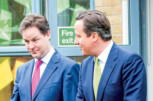
Today the Foreign and Commonwealth Office (FCO) publishes its 2012 Human Rights and Democracy report. It is the yearly indicator of the UK’s commitment to raising human rights standards and stamping out abuses wherever they occur — from Syria to Afghanistan, Saudi Arabia to the DRC.
But our commitment is being tested. The number of outright dictatorships such as North Korea may be declining, but the number of authoritarian regimes remains high. China and others have put economic growth ahead of political freedoms — a model described as “authoritarian capitalism”. Their surging growth rates help them make the case that political freedoms are subservient to economic success. These countries are increasingly making their presence felt on the world stage.
Consequently many countries believe that they are faced with a choice: liberal democracy or authoritarian capitalism — a seductive choice, which I believe poses one of the most serious challenges to our values since the Cold War.
What does this mean for us? As power shifts from west to east, is time up for our values? Aren’t we just imposing them where they aren’t wanted? Absolutely not. In a world of younger populations, growing middle classes and technological openness, support for universal human rights will only grow.
In the Middle East two-thirds of the population are under 24. They are better educated than their parents, more connected to the global community, more exposed to consumerism and, with it, a sense of personal choice. They know they have a right to be heard and they know that change is possible. From the Arab spring to protests in Russia, dissent in Saudi Arabia and upheaval in Syria, the evidence is clear. Authoritarianism cannot suppress liberty for ever. I believe economic rights and political freedoms are mutually reinforcing. This is no pipedream. Yesterday’s dictatorship can be today’s open and prosperous democracy — just look at South Korea.
On my travels as deputy prime minister, be it to Mexico, the United Nations or Ethiopia, I always hear the same message. The UK helps lead the way, and should continue to set an example.
Speaking out
Of course we are and have always been a great trading nation. This means we trade with countries that do not share all our values — an unavoidable reality in our globalised economy. But we should never be silent over human rights abuses to curry favour with those in power. We will continue to speak out, whether it is to China, where bloggers and campaigners are routinely harassed, detained or even tortured; or to a Russian regime that operates with a disregard for the rule of law and views internet freedom as a threat to its stability.
The FCO, the Department for International Development and the British Council work together assiduously overseas to put our values into practice, and we have more influence than we often give ourselves credit for. We help local NGOs hold their governments to account, we help governments better serve their citizens, and we’re helping women and girls across the world achieve what they want — control over their lives through education and jobs.
I take pride in our work overseas and am clear: stepping back simply for commercial expediency would be walking away from our beliefs. It could be just the opening authoritarian capitalism needs to strengthen its appeal.
Developing nations are at a fork in the road. One way leads to liberal democracy, the other to authoritarian capitalism. Never has the choice been starker. It is in the interests of peace and freedom that more of those nations are encouraged down the right path. As a beacon for human rights and the rule of law, and a world leader in international development, the UK will play its part.
Guardian News & Media 2013
Nick Clegg is the deputy prime minister of the UK









